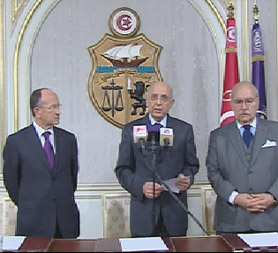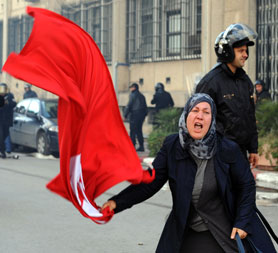Tunisian president stands down after violent protests
After two decades in power, the Tunisian President stands down in the face of violent anti-Government unrest across the country. Jonathan Rugman reports on the crisis, from Tunisia.
Prime Minister Mohamed Ghannouchi has taken over from President Zine al-Abedine Ben Ali on an interim basis after violent rioting spread across Tunisia, protesting against high unemployment, high food prices, and the President’s leadership.
The country is now under a state of emergency, and a curfew, with threats that anyone who breaks the curfew could be shot.
On state TV, the Prime Minister announced that President Ben Ali was temporarily unable to exercise his duties and he would be taking over. It appears that the President has left the country, but his whereabouts are unclear.
The Prime Minister has stepped in until promised elections are held – expected within the next six months at the latest.
I call on the sons and daughters of Tunisia to unite to overcome this difficult period. Tunisian Prime Minister Mohamed Ghannouchi, caretaker leader
In a live address to the nation, Prime Minister Ghannouchi said: “Since the President is temporarily unable to exercise his duties, it has been decided that the Prime Minister will exercise temporarily the duties.
“I call on the sons and daughters of Tunisia, of all political and intellectual persuasions, to unite to allow our beloved country to overcome this difficult period and to return to stability.”
Thousands of foreign tourists remain stranded in Tunisia and the Foreign Office is warning aganist all non-essential travel to the country.
The latest from Tunis
"There are reports that Ben Ali's plane is somewhere in the Gulf, looking for somewhere to land," Jonathan Rugman, speaking from Tunis.
"There are also credible reports that the relatives of Ben Ali's wife are being arrested tonight, and his wife is widely being held responsible for residing over the corruption."
The curfew remains in place over night, and anyone breaking curfew faces being shot, our Foreign Correspondent said.
"The repercussions for the Arab world remain to be seen," he added.

Unrest
The unrest began when police prevented an unemployed graduate from selling fruit without a licence and he set fire to himself, dying shortly afterwards of his injuries.
The situation unravelled quickly in recent days – after a month of protests in towns such as Sidi Bouzid, where the incident took place. The hashtag #sidibouzid has spread globally via social media.
Tourists evacuated as Tunisia President dismisses Government - read more from Channel 4 News and get in touch on Twitter, @channel4news or email news@channel4.com
The President earlier declared a state of emergency and dismissed the Government after at least 12 people were killed in overnight clashes during the protests in Tunis and the north eastern town of Ras Jabel. Government estimates suggest 23 people have died since protests began, but human rights groups estimate the death toll is much higher. A Paris-based human rights group says it has names of at least 66 people killed.
Police fired tear gas grenades and gunshots were also heard in Tunis, as an estimated 10,000 demonstrators gathered calling for an end to Ben Ali’s 23-year rule. The gunfire, at a protest which was initially peaceful, caused protesters to flee.
Crowds of youths retreated a short distance from the building and started throwing stones at police, who responded by firing more tear gas grenades.
World leaders, including President Barack Obama, called for calm.
“I condemn and deplore the use of violence against citizens peacefully voicing their opinion in Tunisia, and I applaud the courage and dignity of the Tunisian people,” President Obama said in a statement.
“I urge all parties to maintain calm and avoid violence, and call on the Tunisian government to respect human rights, and to hold free and fair elections in the near future that reflect the true will and aspirations of the Tunisian people.”
Bullets
Foreign Affairs Correspondent Jonathan Rugman, who is in the capital, said he witnessed “bullets ricocheting off buildings as protesters fled shouting ‘Ben Ali killer'” earlier today.
Our correspondent also witnessed a man being tear gassed while laying on the ground. Follow him on Twitter @jrug for the latest.
A second curfew – the first of which was broken last night – has begun and he is now obeying that curfew in his hotel.

Power
In power since 1987, 74-year-old Ben Ali made sweeping concessions on Thursday evening in a doomed attempt to hold on to power, saying security forces would no longer use live ammunition against protesters and promising freedom of the press and an end to Internet censorship. He also said the prices of sugar, milk and bread would be cut in response to the protests. Unemployment in the country is 14 per cent but the rate for graduates it is more than double that.
For the Tunis protesters, it was not enough.
“We don’t want bread or anything else, we just want him to leave,” they chanted. “After that we will eat whatever we have to.”
But for protesters, the opposition and online activists, the concessions were too little too late, and many told Channel 4 News they expected the ‘Jasmine Revolt’ – named after the country’s flag – to continue until something changed.
“It’s not enough to unlock Dailymotion and YouTube to turn the page,” one Tunisian tweeter said, adding: “Too much blood has flowed.”